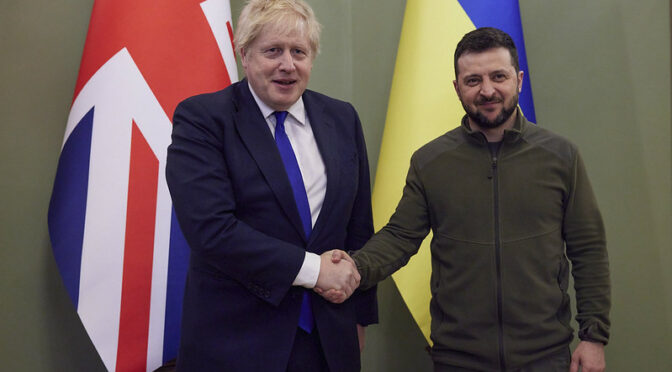Article published in The Daily Telegraph, 18 July 2022. © Richard Kemp
The fall of Boris Johnson contributes to Ukraine’s rising peril. His Churchillian support for Ukraine and push for blistering sanctions in the face of a lacklustre response from Joe Biden and heel-dragging in European capitals propelled him to world leadership in the campaign against Russia. None of Johnson’s potential successors are likely to equal his resolve, especially as the domestic economic consequences of the war continue to bite and bite hard.
With the Tory leadership election set to drag on at least into September, all political attention will naturally be on that, to the exclusion of new policy and action on the war. Media eyes, in any case tiring of Ukraine, will also be distracted, removing much of the impetus for government ministers and civil servants to focus on the conflict.
More worryingly, such diversion isn’t just a feature of British politics. It is a phenomenon across the West, occurring at precisely the worst time for Ukraine. In America, the political and media spotlights have turned to the mid-term elections in November. And while most American voters, on both sides, back Washington’s support for Ukraine, their main concern is economic issues that directly affect them like the soaring inflation, at least one third of which is directly attributable to the war and sanctions against Russia.
Biden, in campaign mode and eager to disperse responsibility, has emphasised that link between Western inflation and Putin’s actions. That will play out in longer term congressional support for government policies on Ukraine but more immediately we are likely to see greater caution from an administration that is already deeply fearful of losing its narrow majority in the Senate and the House.
The balance between fighting for a democracy assailed by authoritarian aggression, a generally popular cause in the States, and managing economic pain at home, is going to be influenced by how successful the fight is. Right now, with 54 billion dollars of US resources already ploughed into the war, Ukraine is losing. Putin has taken Luhansk, with the last stronghold, Lysychansk, falling without much of a fight. There is little hope of Kyiv holding onto what remains of Donetsk. Putin has signalled a tactical pause to rest and reconstitute his forces after Donbas is taken, but that could equally be the well known Russian maskirovka – deception – as he plans to redeploy forces for a push north into Kharkov or west along the coast towards Odessa. Bad news from the front will have the opposite effect of stiffening support at home.
In Europe, the results of recent elections in France and Spain have undermined what was already tenuous political backing for Ukraine. Polling shows that steep rises in cost of living across the continent – significantly worsened by the war – are wearing away popular support in both east and west. This will likely be reflected in upcoming elections including in Sweden, the Czech Republic, Slovenia and Poland. Last week, the EU Commission blocked a 1.5 billion euro loan to Kyiv, displaying the increasing concern for the country’s future as well as internal economic worries. This erosion of support will be compounded as the war drags on and winter approaches with increased demand for Russian gas and oil.
To continue the fight, Kyiv needs even greater economic assistance from outside than it has already received. This is only possible if there is the political will to provide it and all signs suggest that won’t be forthcoming. Instead it is likely that when Putin decides he has bitten off enough for the time being, Western leaders will pile on to encourage Zelensky to come to terms. They will fall over each other to revive the status quo ante, lifting sanctions and restoring the flow of Russian resources. Then we will see what a reinvigorated Putin has in mind next.
Image: Crown Copyright

